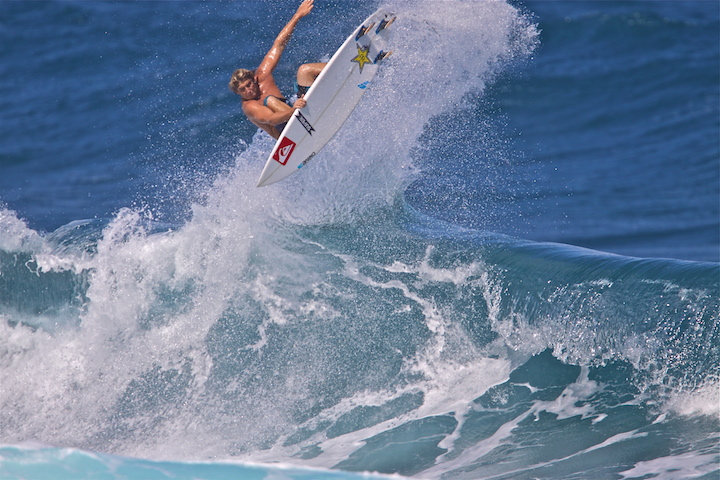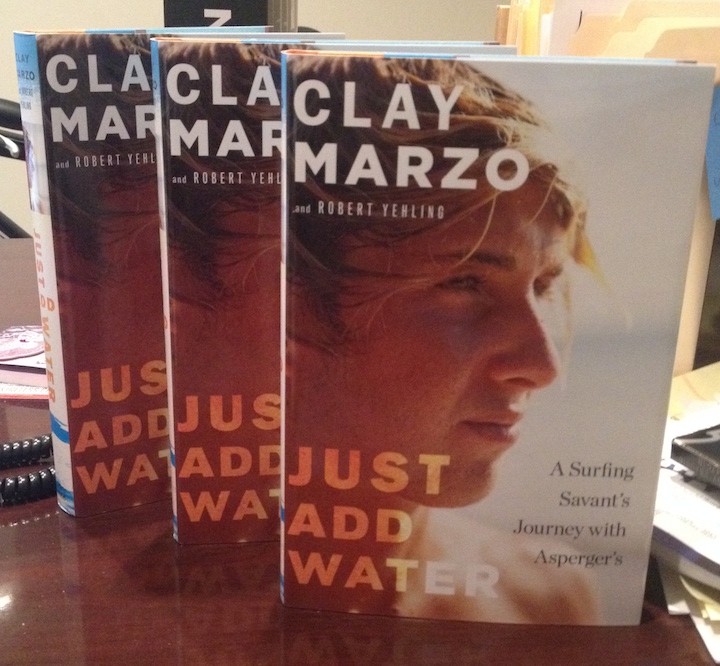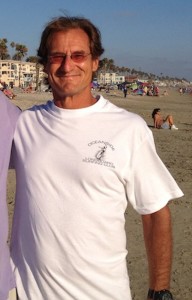
Living with Asperger’s is like living without your skin. You are fully exposed, raw and vulnerable to the world.
Affectionately know as Aspie’s to those who love them, Asperger’s syndrome includes those who rate low (meaning high-functioning) on the autism scale. Aspie’s are much more sensitive to sounds, light, taste and touch than the average Joe. Even more challenging, they are socially blind…they don’t pick up on the social nuances, like someone crossing their arms or taking a small step backwards means they don’t like what you just said. It’s extremely hard to make and keep friends when you can’t read facial expressions and you have no idea you’ve just said something “wrong.”
Clay Marzo, the star of the new book, Just Add Water: A surfing Savant’s Journey With Asperger’s, knows all about this. Though he is known as the best freestyle surfer in the world, Clay struggled most of his life with undiagnosed Asperger’s syndrome. Clay’s story makes for a surprisingly entertaining beach read and his rise to the top is beyond inspiring.
Another reason to read his riveting story….autism affects 1 in every 68 children. We will ALL be touched by autism in some way.
I recently exchanged emails with my writer friend, Robert Yehling, who co-wrote Just Add Water, alongside Clay. Here’s what he had to say:
HOLLY: Robert, what led you to write this story?
ROBERT: This story came to me. I was having dinner with my sweetheart, Martha Halda, and my good friend Mitch Varnes when Mitch brought up the idea of a book on Clay. Mitch has been Clay’s manager for almost 10 years. I was a little unsure at first, only because memoirs from surfers don’t tend to do well commercially, but when Mitch and Martha started talking about Clay’s Asperger’s and the challenges of parenting an autistic kid, I realized this book had to be written.
HOLLY: Once you got started, what surprised you most?
ROBERT: Clay’s remarkable wisdom when it comes to the ocean, his view of the world, and working with autistic kids. He is a loving and caring man who can fully express it at times, which in my experience is unusual on the spectrum. I expected emotional coolness and aloofness, but instead, he was warm and kind quite often. Quiet, but warm and kind. The other surprise is that he was a good writer when he was a kid; his stories from grade school are outstanding (we ran one in the book). While we were driving around Maui, the digital recorder rolling, he said to me, ‘You know what’s cool about working on this book? I feel like I did when I used to write all the time. It’s nice to feel like that again.’
HOLLY: I totally agree with your observations about Clay being warm and kind. The Aspie’s I’ve met are some of the sweetest, most loving people I know. That they can’t connect with others is such a misconception. For many of them, they want and need friends more than anything else. That said, what in your opinion, was Clay’s biggest challenge?
ROBERT: Clay’s biggest challenge is reading facial and social cues, like most with Asperger’s. It frustrates him, but he’s learned to ask someone he trusts to help him interpret facial expressions. His other lifelong challenge concerns serious anxiety issues. They have already deeply affected his professional surfing career, making competition very difficult for him. He gets anxious with just a few surfers in the water, so he often paddles off and surfs alone. Plus, he doesn’t do well in dog-eat-dog environments, which a pro surfing contest certainly is. He feels the same in any crowded restaurant, at airports, around people he doesn’t know… he will always be challenged by this.
HOLLY: How does he overcome that challenge?
ROBERT: Clay’s tendency in any situation like this is to go off by himself, or play with his dog. He also has a great one-two support team, his mother, Jill, and girlfriend, Jade Barton, who talk with him every time his challenges lead to uncomfortable moments in public, or at home. They essentially break down what happened, and help him see alternative ways of dealing with it. As his behavioral therapist, Carolyn Jackson, told me, ‘His brain is not wired to handle these things like we would. Our responses are built-in; he doesn’t have those.’
HOLLY: Clay is lucky to have found such an awesome support group. I wish all Aspie’s had people like Clay’s mom and girlfriend in their corner. I imagined you learned so much yourself while putting this story together. How did writing this book change you?
ROBERT: I have a far deeper appreciation for what parents and loved ones experience and how their lives are impacted by kids and adult children with autism. Martha’s niece is the mother of an autistic boy, and in spending all the time with Clay and his mother, I was able to give Sarah a bit of a preview of things to come — something I’d never be able to do before. The book also has changed my view of people with high-functioning autism completely. 180 degrees. When I talk with or meet someone who is autistic or an Aspie now, I find out what their areas of interest are, and that’s what we talk about, or what I do with them. Never would have known how to interact like this had Clay Marzo not walked into my life.
HOLLY: What a wonderful gift! Why should other people read Just Add Water?
ROBERT: One reviewer put it, ‘It’s a great beach read and, at the same time, a very important read on one of our biggest social issues.’ That captures it for me. It’s both a lot of fun and a very inside look at how one autistic child impacts a family and community — and in Clay’s case, the world, since he’s an internationally renowned surfer. I think the notion of a world-class athlete being autistic is, in itself, going to arouse curiosity. How did he become so great? How does Asperger’s help his focus and prowess as a surfer? We have that, but also how the Marzo family swung the doors open and gave their varying opinions of life with an autistic son/brother — and these opinions are raw and contentious in places. We’ve had more comments on this than anything else.
HOLLY: I bet you have. There is so much diversity of opinion in the world of Asperger’s and of course, no two Aspies are alike. This has been such a great interview Robert, anything you’d like to add before we go?
ROBERT: This was one of the most fun projects in my 40 years as a professional writer, and one of the hardest. I had to use every interviewing and conversation-creating trick in the book to get enough recorded material from Clay to produce the book the way we wanted it. Sometimes, that meant sitting in absolute silence for hours at a time. I often asked questions four or five different ways, trying to spark answers. Some days, it was very tough. When I went with the flow and sat silently, the next day was always good.
HOLLY: Well your time and effort were well worth it. The book is fantastic. Thank you so much for your time Robert!
ROBERT: My pleasure.
To order this must-read book, click here or visit your local Barnes & Noble. To learn more about Robert Yehling and his writing, check out his website.




